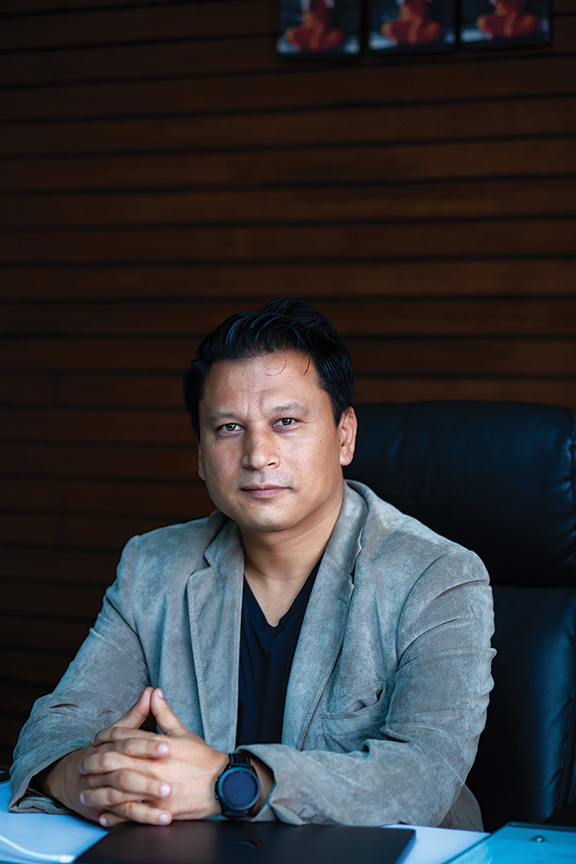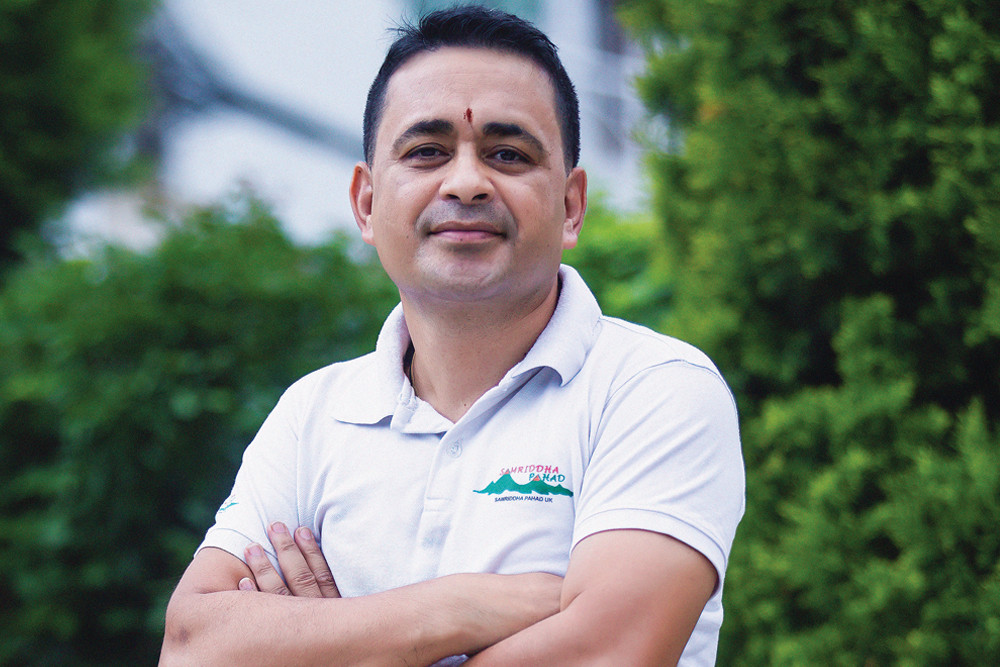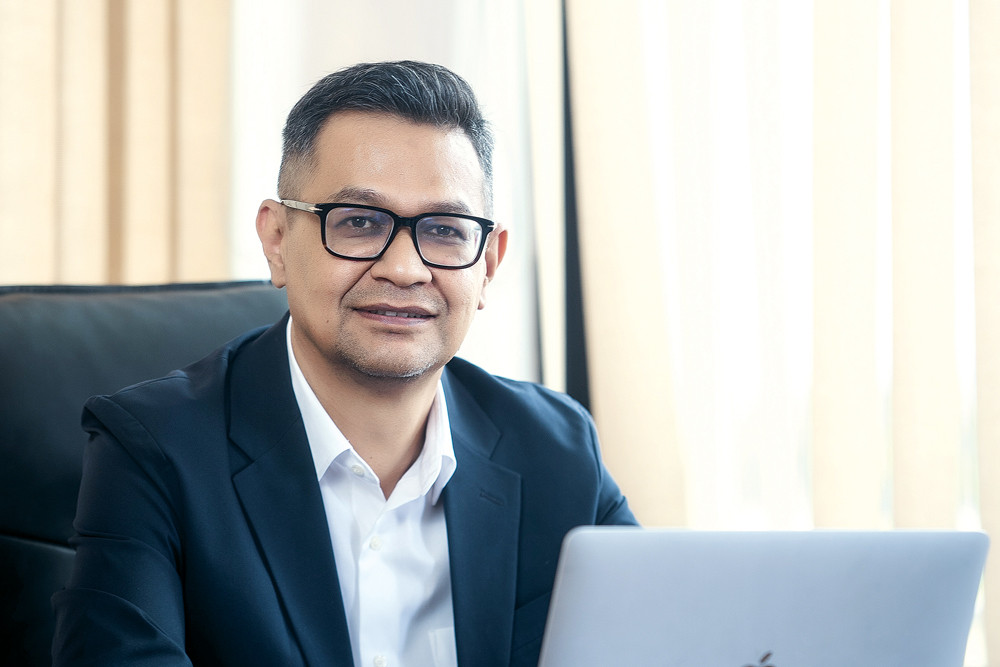
The Chairman and Founder of Sagar Group, which operates in myriad segments such as IT & Lifestyle, Health & Lifestyle, Fashion & Lifestyle, Resource Planning Software, Retailing Franchise, Hospitality, Wellness Centres, Micro Finance, Events & Media, and now Smart Agro, Sagar Dev Lakhe is a multifaceted entrepreneur.
Apart from handling the multiple vertical industries under Sagar Group, Lakhe is also the Director of Franchise Development which is the agency of franchise operation to deal, manage and supply XIMIVOGUE in Nepal. XIMIVOGUE is one of the top leading Korean premium lifestyle brand with 7000+ high-quality products having 1400+ worldwide stores.
He also sits on the Board of Directors of Chaitanya Spa.
Additionally, Lakhe is Managing Director of xLab Global LLC. xLab is a brand for IT, electronics, smart health and lifestyle, cyber security, and ERP products and solutions based out of Texas USA.
His business acumen can be measured by the sheer size of Sagar Group which he started from ground zero. By his own admission, they are one of the top five IT product distribution companies. He established xLab Global brand in Nepal and worked for its global expansion. “With just a modest amount of ‘Support on Demand’ cost policy, small and medium size organisations can get Odoo ERP without paying for software or solutionswhich is practically hard for them to afford. “Since 2007, we have been leaders in establishing the habit of purchasing genuine antivirus and privacy software. With our endeavour, in 2008-2010, Micro Laptop was introduced in Nepal at a cost of Rs. 6500 (50$). In 2008-2010, Kaspersky Antivirus Solution collaborated with the Nepal Government to launch the Virus Free Nepal initiative,” informs Lakhe.
As a leader, his focus is on aligning employees to be socially responsible, problem solvers. He engages in overall strategy planning, critical analysis, advice, technology adoption and driving the vision of the group, besides most importantly, helping create business solutions that work.
In an email interview with B360, Lakhe shared his thoughts on leadership.

What’s your definition of a ‘leader’?
The most crucial role of a leader is to devote time and effort to focusing on the team. Their most significant task is to direct their team’s time and talent toward the organisation’s most vital tasks. Profit, innovation, efficiency, and effectiveness are the driving forces behind the most successful organisations. The genuine mark of a leader is the willingness to persevere with a risky course of action - an unconventional company strategy, an exclusive product development roadmap, or a controversial marketing campaign - even when the rest of the world questions why you aren’t following the herd. To put it another way, true leaders are content to zig while others zag. They recognise that in an age of hyper-competition and constant disruption, the only way to stand out is to stand for something unique. In Nepal, I would consider Kulman Ghising, Biswas Dhakal and Binod Chaudhary as successful leaders. These personalities embody my principles of a true leader: attracting and retaining talent, developing current talent, managing performance, forming leadership teams, making decisions, reorganising to capture value quickly, lowering long-term overhead costs, making culture a competitive advantage, leading transformational change, and transitioning to new leadership roles.Can anyone be a leader?
Of course, anyone can be a leader, but they are limited to their restricted mindset, thinking process, and the culture in which they grew up. I always live by the saying, “if we can’t do great things, we can do small things in a great way.” Everyone possesses leadership characteristics, but not everyone is presented with the exact combination of circumstances in which those qualities can truly flourish and be acknowledged. Everyone, on the other hand, may develop their leadership skills and put them to good use in their daily lives, both in and out of the office. Leadership is a collection of abilities that can be developed through time through training, perception, practice and experience. Learning to lead is a lifelong endeavour. Good leaders look for opportunities to expand their knowledge and gain new abilities.Who comes to your mind when ‘an ideal leader’ is mentioned?
Elon Musk, Steve Jobs, and Jack Ma are three ideal leaders. In terms of success or leadership qualities, they are all pretty different. For me, Elon Musk is a kind of superhero. Steve Jobs was the epitome of superb masterwork of technology ingenuity, user experience, and marketing. Jack Ma - he transformed the lives of the poorest people and explored ways to connect them globally, even if they were almost illiterate in internet world and other languages.
An incident which presented a great deal of leadership challenges for you?
Bringing printing and solution “Brother” brand from ashes within three years and making it the No. 1 printing and solution brand in Nepal is something I carry as a bravery badge. It was blacklisted and was declared a debacle but we could revive it with the help of excellent teamwork. I still consider that as a true mark of my leadership. However, as we all know, finding true talent and skilled professionals in Nepal is an onerous task. Even if we do get those talents by luck, it’s difficult to retain them for the company’s long-term success and this is my constant challenge. Staying inspired all the time in a Nepali business environment demands that a leader exhibit grit.How important is it to have good team to work?
A good team is the essence of a company since team members help a company to accelerate its pace to success and growth. However, it is also the task of a true leader to create a good team. Effective team leaders ensure a high level of team morals and motivate members to perform well. Leaders can influence the morality of their employees by helping to create a sense of confidence and faith in their employees and the business as a whole. With his innovative and creative mind, Steve Jobs changed the whole pattern of living. But his innovations would not have reached the hands of so many people around the world without his team of hard-working professionals and their skills. In fact, teamwork is vital to the achievement of an organisation’s overall goals and objectives.The genuine mark of a leader is the willingness to persevere with a risky course of action - an unconventional company strategy, an exclusive product development roadmap, or a controversial marketing campaign - even when the rest of the world questions why you aren’t following the herd. To put it another way, true leaders are content to zig while others zag.
When should leaders hand over the leadership position?
When you feel someone can lead you or lead you to maintain your legacy. It is important to remember that everybody can be a leader, not just the person who has the loudest voice. As the current leader, it is my job to ensure that each member in the group is the next leader, as our organisation’s mission is to develop leadership quality across all. Here are 10 uncompromised qualities which I always seek in leaders:- interested in training other young leaders
- able to connect with all members of the organisation
- organised
- eager to learn
- technology-driven mentality
- self-motivated in any scenario
- inspiring others
- emotional intelligence
- spiritually minded
- socially responsible
What major challenges has Covid 19 brought to your line of business?
Holistically, we got 3600 challenges like any other business. In particular, over 25% of human resources did not continue owing to location, anxiety and most significantly, mindset formed by news, opinions, and predictions during this pandemic. In terms of revenue, in terms of progress, it’s like a speed breaker, since it’s happened twice and no one knows what will happen next. We are just handling and attempting to overcome these problems since they are similar to a disaster, and we must handle according to our own strength and level, which I believe everyone is doing.What do you consider your most significant accomplishment as a leader?
There are numerous small things that may be insignificant to some, acceptable to others, and significant to others, but for me aside from those physical things, I am cherishing the fact that I have changed many people’s lives, particularly the lives of employees and business partners. Some of them have gone on to become company owners, entrepreneurs, and leaders. On the other hand, we have built an exemplary business with a distinct and powerful cultural organisation from the ground up, or from zero to today’s condition, which I feel is the most significant achievement.How can a leader prepare for the unknown?
Leaders should keep company procedures flexible, assure variable costs, and diversify across products and markets wherever feasible to mitigate unknown risks. They would see any obstacles as a chance to scale their vision, source, or resource.
Published Date: July 26, 2021, 12:00 am
Post Comment
E-Magazine
RELATED Leadership


.jpg)


.jpg)